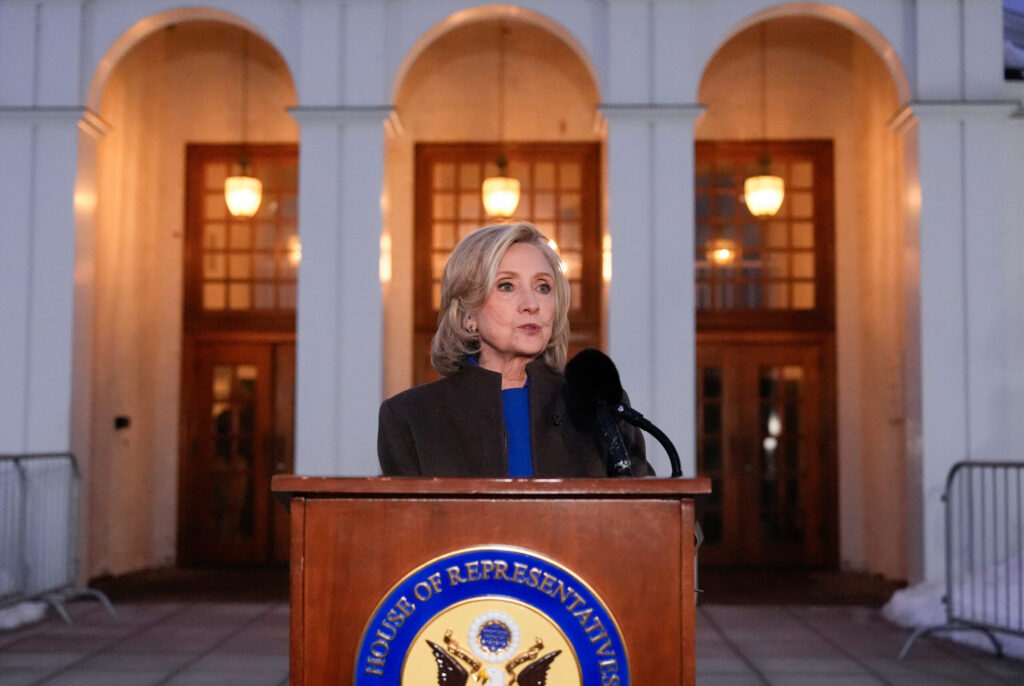Trump signs deal ending government shutdown

The longest federal government shutdown ended Wednesday night after the U.S. House voted for a new spending measure and President Donald Trump shortly after signed the deal reached by Democrats and Republicans.
In a 222 to 209 vote, the House passed a short-term, Senate-approved continuing resolution to fund the government through the end of January. The Republican conference largely supported the bill, with a handful of Democrats joining them.
Six Democrats voted in favor: Reps. Jared Golden (D-ME), Adam Gray (D-CA), Henry Cuellar (D-TX), Don Davis (D-NC), Tom Suozzi (D-NY), and Marie Gluesenkamp Perez (D-WA).
Rep. Thomas Massie (R-KY) and Greg Steube (R-FL) split with their party to vote against the measure.
The vote and president’s signature concluded the shutdown saga that sowed chaos across the country, leading to thousands of flight cancellations, millions of families without food assistance and states scrambling to fill the federal void. Democrats and Republicans blamed each other for the standoff.
In Colorado, Gov. Jared Polis asked for – and received – the legislature’s blessings to tap state dollars to pay for a federal program designed to help women and children, as well provide money to a network of foodbanks amid uncertainty over the Supplemental Nutrition Assistance Program. Colorado also decided to pay for the operations of two visitor centers at the Rocky Mountain National Park, which the Trump White House decided to keep open.
The 43-day saga played out in the U.S. Senate, during which Democrats dug in their heels to demand healthcare concessions in exchange for their votes to reopen the government. The standoff broke the record of the previous shutdown, which took 35 days under the first Trump administration.
Democrats sought to extend enhanced tax credits aimed at bringing down the cost of insurance premiums offered by the Obama-era Affordable Care Act. Republicans said they are open to negotiating the policy – but not before the federal government reopens.
Colorado’s two U.S. senators voted against the deal to reopen the government.
Wednesday’s vote is the first the House has taken since Sept. 19, with the chamber coming off of a 54-day recess.
Republicans almost unanimously supported the funding legislation, despite many in the caucus often voting against continuing resolutions as a way to fund the government. The conservative House Freedom Caucus, often the thorn in the side of the leadership, sent a memo saying the bill is a “complete and total win.”
Speaker Mike Johnson’s proclamation of party unity over the course of the shutdown hit a snag on Tuesday night heading into Wednesday. Republicans became aware of a provision tucked into the spending deal that essentially allows senators to sue the U.S. government for accessing their data without their knowledge.
The Senate provision was included after it was revealed that several GOP lawmakers’ data were collected as part of a Biden-era investigation into the Jan. 6 Capitol riots.
GOP members testifying before and sitting on the Rules Committee insisted they had no idea the provision was included, and many criticized the “optics” behind it. But had Republicans wanted to alter the bill to strip the provision, it would have to go back to the Senate for approval.
So, Johnson promised a “standalone” bill on Wednesday that would repeal the provision, with a vote on the legislation to be on the “fast track suspension calendar” for next week. His statement came a half hour after Rep. John Rose (R-TN) introduced such a bill and said, “Two wrongs don’t make a right.”
Johnson gave his members a 36-hour notice to return to Washington late Monday after the Senate altered the stopgap bill that the House first passed in September. The original spending deal expired on Nov. 21, which quickly became an unattainable goal after the shutdown spilled over into November and gave appropriators no time to negotiate on the 12 measures needed to fund the government.
In the Senate, seven Democrats and an independent legislator who caucuses with Democratic conference joined Republicans to clear the 60-vote threshold to break the filibuster on Sunday evening. The chamber then passed the bill on Monday, sending it to the House for approval.
After 14 failed votes on the short-term bill previously passed by the House, the Senate’s version extended the funding through Jan. 31 and included a package of three appropriations bills that would fund the Veterans Affairs and Agriculture departments, among other things.
The continuing resolution notably does not include any extension of the enhanced Obamacare subsidies, which are set to expire at the end of this year — the main issue that Democrats have been fighting for. Consequently, some argued that Senate Democrats went through the entire government shutdown to ultimately get nothing. Democratic leaders responded that their fight goes on.
In response to the COVID-19 pandemic, Congress had adopted the American Rescue Plan Act of 2021, which, among other provisions, temporarily expanded eligibility for the premium tax credits for tax years 2021 and 2022. Notably, the law eliminated the income limit of 400% of the federal poverty level, thereby allowing more Americans to quality, and provided larger subsidies compared to the original Affordable Care Act.
The Biden administration and Congress then extended these enhanced tax credits in the 2022 Budget Reconciliation Law for another three years and established the sunset date of Jan. 1, 2026. Without the enhancement, the tax credits would apply only to households earning incomes at or above 100% of the federal poverty level. Additionally, the amount of tax credits would shrink.
House Democrats slammed the Senate-passed version, and House Minority Leader Hakeem Jeffries (D-NY) introduced a discharge petition in an effort to force the speaker to hold a vote on a three-year extension of the expiring subsidies. The petition would need 218 signatures, which is unlikely given the House Democratic caucus sits at 214.
Senate Republicans promised to allow a vote next month on the expiring subsidies, with no guarantee that it would pass Congress or, assuming it did, secure the president’s signature. Johnson has not made any promises to bring up a bill to extend the subsidies and he made clear last week that he was “not part of any negotiations.”
As another concession, Republicans agreed to reverse thousands of planned layoffs that the White House announced on Oct. 1, the first day of the shutdown.
The deal also included a provision to ban nearly all hemp-derived THC products. The legislation adds various parameters to the definition of hemp, which would prevent “the unregulated sale of intoxicating hemp-based or hemp-derived products, including Delta-8, from being sold online, in gas stations, and corner stores, while preserving non-intoxicating CBD and industrial hemp products,” according to the bill’s summary.
Colorado in 2022 and 2023 passed legislation that resulted in state regulators banning the sale of intoxicating hemp manufactured through chemical synthesis from the shelves of marijuana shops. That legislation also made it illegal to sell such products in Colorado, while carving out provisions that allowed Colorado hemp manufacturers to sell products elsewhere in the nation where hemp remains legal.

















